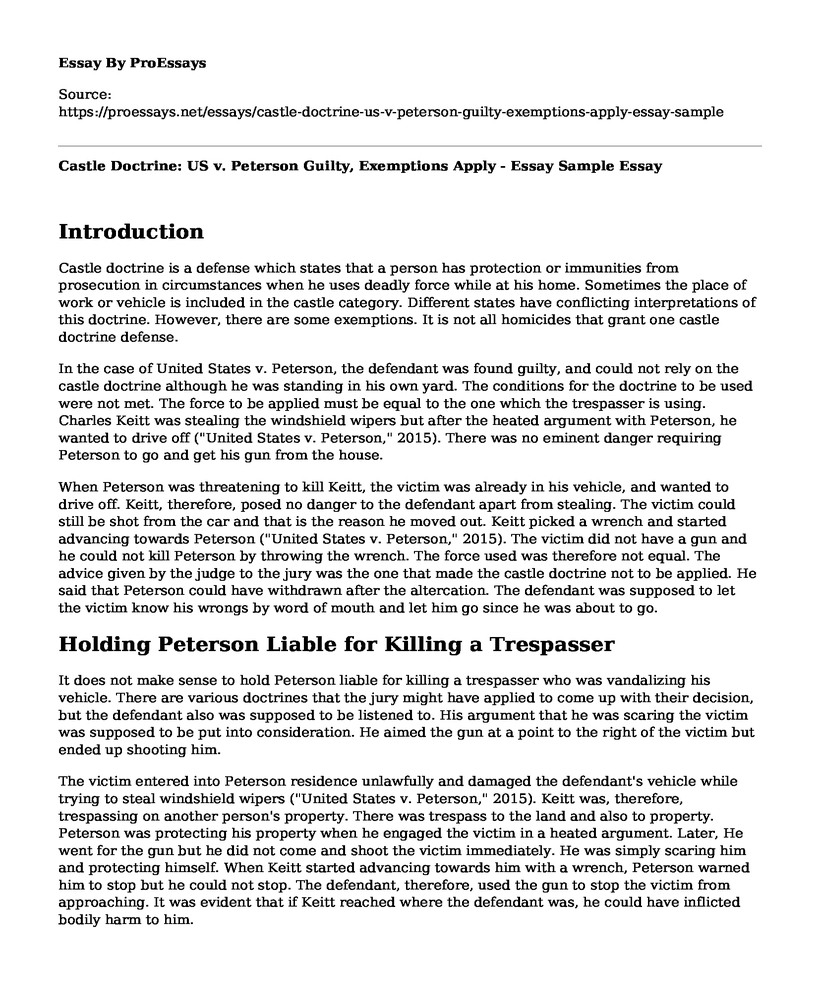Introduction
Castle doctrine is a defense which states that a person has protection or immunities from prosecution in circumstances when he uses deadly force while at his home. Sometimes the place of work or vehicle is included in the castle category. Different states have conflicting interpretations of this doctrine. However, there are some exemptions. It is not all homicides that grant one castle doctrine defense.
In the case of United States v. Peterson, the defendant was found guilty, and could not rely on the castle doctrine although he was standing in his own yard. The conditions for the doctrine to be used were not met. The force to be applied must be equal to the one which the trespasser is using. Charles Keitt was stealing the windshield wipers but after the heated argument with Peterson, he wanted to drive off ("United States v. Peterson," 2015). There was no eminent danger requiring Peterson to go and get his gun from the house.
When Peterson was threatening to kill Keitt, the victim was already in his vehicle, and wanted to drive off. Keitt, therefore, posed no danger to the defendant apart from stealing. The victim could still be shot from the car and that is the reason he moved out. Keitt picked a wrench and started advancing towards Peterson ("United States v. Peterson," 2015). The victim did not have a gun and he could not kill Peterson by throwing the wrench. The force used was therefore not equal. The advice given by the judge to the jury was the one that made the castle doctrine not to be applied. He said that Peterson could have withdrawn after the altercation. The defendant was supposed to let the victim know his wrongs by word of mouth and let him go since he was about to go.
Holding Peterson Liable for Killing a Trespasser
It does not make sense to hold Peterson liable for killing a trespasser who was vandalizing his vehicle. There are various doctrines that the jury might have applied to come up with their decision, but the defendant also was supposed to be listened to. His argument that he was scaring the victim was supposed to be put into consideration. He aimed the gun at a point to the right of the victim but ended up shooting him.
The victim entered into Peterson residence unlawfully and damaged the defendant's vehicle while trying to steal windshield wipers ("United States v. Peterson," 2015). Keitt was, therefore, trespassing on another person's property. There was trespass to the land and also to property. Peterson was protecting his property when he engaged the victim in a heated argument. Later, He went for the gun but he did not come and shoot the victim immediately. He was simply scaring him and protecting himself. When Keitt started advancing towards him with a wrench, Peterson warned him to stop but he could not stop. The defendant, therefore, used the gun to stop the victim from approaching. It was evident that if Keitt reached where the defendant was, he could have inflicted bodily harm to him.
There are several legal grounds that Peterson would have used to defend himself. The first one is the castle doctrine. A proper interpretation of the self-defense would have favored the defendant. He shot the victim while he was at his home. Keitt was the intruder, and Peterson was supposed to look for the appropriate way to scare the trespasser ("United States v. Peterson," 2015).The vehicle is also personal property and hence inclusive in the castle doctrine. The other legal ground is that he warned the victim not to come closer but he continued advancing. Keitt was prepared with the wrench and therefore, he could harm Peterson after getting closer.
References
United States v. Peterson. (2015, September 14). Quimbee. Retrieved May 13, 2020, from https://www.quimbee.com/cases/united-states-v-peterson--2#
Cite this page
Castle Doctrine: US v. Peterson Guilty, Exemptions Apply - Essay Sample. (2023, Aug 01). Retrieved from https://proessays.net/essays/castle-doctrine-us-v-peterson-guilty-exemptions-apply-essay-sample
If you are the original author of this essay and no longer wish to have it published on the ProEssays website, please click below to request its removal:
- Veterans Reactions to Their Experiences of the First World War and Homecoming
- Veterans Education Benefits Essay
- Treatment of Women Veterans With PTSD Paper Example
- Essay Sample on Innovation and the Public Manager
- Essay Example on Bonus Army: WWI Vets Fight for Rights
- Veteran Medical Care: A Comprehensive Overview - Essay Sample
- Free Essay Sample on Captain Sullenberger: Leading 155 to Safety After Bird Strike







